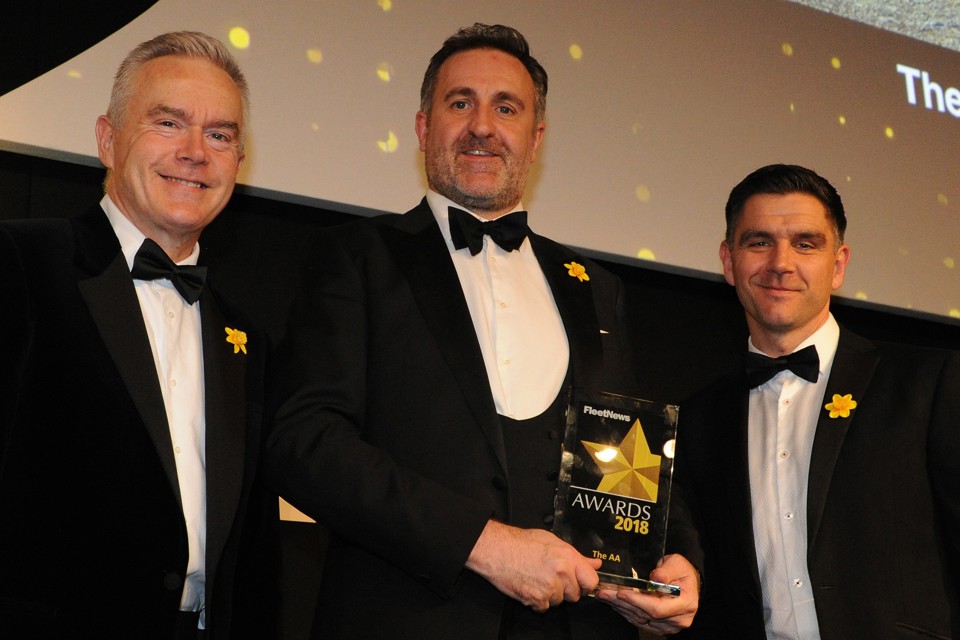The AA has long been an important fixture in the fleet industry. It has around 10 million customers in the sector, while its broad offering includes breakdown cover, incident management, downtime management, telematics services, maps, hire car provision, DriveTech risk management and fuel cards.
It is also a regular Fleet News Award-winner: the 2018 ceremony marked the fifth time it was named supplier of the year in the past six years.
While its bright yellow patrol vans continue to be the most visible part of its operation, the company is increasing its focus on data-led products, such as connected car services.
“Twenty-five years ago we were very much about mechanics going out to cars,” says Stuart Thomas, director fleet and SME Services at The AA. “Today people pay for expertise as well as technology, and the future is going to be very data-led.
“You still need the people and access to the expertise, but the direction of travel is going to be more about data and technology, and that is where our investment is going.
“In fleet over the past 12 months, we’ve put money into our administration systems and doing work in terms of processing, things that you wouldn’t see front-end necessarily, but it’s really important to fleets in the way we bill and the data we supply.
“We’ve got a new MI (management information) portal, and we’ve now got a live view of our breakdown services, so a lot our big fleet customers can log in and see breakdowns as they occur, they can track them and know what is happening.
"This leads to what we are doing for the future, as part of our focus is on joining our processes together.”
Thomas says one example of this is a product launched with Jaguar Land Rover last year. If a patrol goes out to a breakdown and is unable to repair the vehicle, The AA now has the technology to look at the capacity of nearby workshops, the location of a replacement vehicle and whether they have any specific requirements such as a towbar.
The driver will then be taken to a replacement vehicle, while The AA will ensure their car is repaired and repatriated.
“That’s for a manufacturer at the moment, but it could be expanded for a fleet who has their own network and rental supplier; it’s about starting to join up some of the dots to make their lives easier,” adds Thomas.
Fleet News: Will telematics technology form a big part of this?
Stuart Thomas: Telematics is one of those words which is used a lot, but I think the fleet industry has maybe gone a bit deaf to it because for an operational fleet it’s a no-brainer.
They know about it, there’s a list of things it does, and if you are going to change that it’s got to be more relevant to different situations, so connected vehicles is a focus for us.
We’ve got a joint venture with Intelematics and have developed the Car Genie which gives things like tracking and eco scores, but the data it gives us in terms of prognostic capability is really important.
It allows us to assess possible vehicle faults in real-time and to alert our technical centre and the driver if a problem is about to develop.
We’ve found that it can predict about one-third of the breakdowns, such as faults with batteries and diesel particulate filters, and this allows us to intervene and help prevent the breakdown in the first place.
I think that’s the direction of travel for fleets as well. We know that many already have telematics embedded, but can we add value to that? Can we take the data feed and give fleets technical advice, breakdown advice, things that would be useful to them?
We sit in the ecosystem where we are already talking to manufacturers on that basis so we are uniquely involved in that versus a telematics business.
FN: How will the growing electrification of the UK’s vehicle parc change your breakdown services?
ST: We will still have breakdowns to deal with, but the nature of those breakdowns will change dramatically.
There will still be faults with things like the 12-volt battery, suspension and tyres, but dealing with the actual electric drivetrain will need a different approach.
All our patrols are currently trained to the IMI Level 1 standard in electric/hybrid vehicle awareness which means we can work safely around EVs.
We have the investment to train them to Level 2 (routine maintenance), and, finally, by 2022 they will be Level 3 (repair and replacement).
Also, by 2023 our patrols will be trained to diagnose issues with charging posts, because if you are called to someone’s home because their EV isn’t going, is it the car, is it the cable, or is it the charger?
It’s not like going to a combustion engine which is an entire system, there is a whole infrastructure going into EVs now so we have got to be able to deal with it all.

FN: How can you help EV drivers who have run out of charge and are stranded?
ST: You can take portable chargers, but the problem is they only do so many charges and they take time, and do you really want to be sat at the side of the road charging?
Currently, we’ve got an agreement with Chargemaster so our patrols have charging cards for the Polar network. We can take the individual to the nearest Polar charging post and give them, say, £5 of charge, while the driver has a coffee.
Some manufacturers have hydrogen vehicles so we are trialling some portable refillers which will give a range of something like 35 miles.
That’s very much a trial, but there are a couple of manufacturers that are betting on that route, so we’ve got to be prepared for that as well.
FN: What other ways are you helping fleets reduce vehicle off-road time?
ST: Vehicle recalls can be a big issue at times and we are working with manufacturers to deliver that work in the most effective way for them and their dealer networks. Fleet users are big buyers of vehicles, so if there is a recall it can impact them.
We are looking at how we can make that as seamless as possible. We know the dealer networks are under a certain amount of pressure so we want to be complementary to what they do.
We’ve got mobile patrols that are dedicated to maintenance, and if you are a fleet with a large number of vehicles and it is a small job that needs doing, then booking those into a dealer and having the work done could cause problems operationally.
I think in the past The AA looked at things in isolation, but we are now trying to be complementary and add value to processes.
With the recalls, we are not trying to take work away from dealers, we are trying to support them as well as supporting the manufacturers to deliver something that they sometimes don’t necessarily want to do because, ideally, they don’t want that to happen in the first place.
We did some trials last year and those will carry on this year.























Login to comment
Comments
No comments have been made yet.